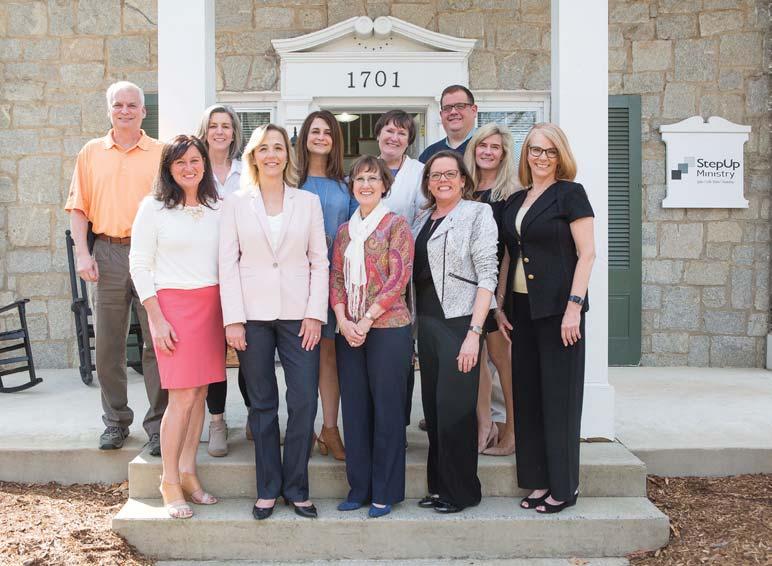
3 minute read
GIVERS
Strategic philanthropy empowers leadersthe HARVARD
by JESSIE AMMONS RUMBLEY 100
Advertisement
Chuck ReCorr has spent almost five decades crunching numbers to maximize outcomes: He leads a team of wealth managers at Bank of America Merrill Lynch who oversee investments for high-net-worth clients. Meanwhile, since 2011, ReCorr has also quietly been investing in Raleigh’s nonprofit community: This month, he will have sent 100 nonprofit leaders and board members to social enterprise courses at Harvard Business School. “The premise is that we need to reward human capital,” ReCorr says. “I can give you $5,000 and it will, say, send 10 kids to camp. Or I can send your executive director to Harvard and they will figure out how to send 50 kids to camp, or 100 kids, or 200 kids. What I’m hoping to emphasize through
CONTINUED EDUCATION
At right, from left to right: Oie Osterkamp, Staci Barfield, Jackie Craig, Holly Richard, Lisa Humphreys, Christine Peterson, Dana Lange, Alice Lutz, Matthew Strickland, Cristin DeRonja, and Linda Nunnallee went to Harvard at separate times, but have found in each other a small group to meet with regularly in Raleigh.
this exercise is that human capital is the most important asset we have in the community.” Along the way, these movers and shakers, advocates for diverse causes, have connected over a shared common education. They’ve tapped into each other’s resources and together forged a stronger local nonprofit network. “No other philanthropist has done this,” says Jackie Craig, executive director of The Green Chair Project, which reuses donated home furnishings to benefit those recovering from homelessness or crisis. Craig is a May 2017 graduate of the four-day course. “It’s remarkable. … As executive directors, to be lifted out of our day-to-day and be encouraged and informed at such a high level, is life changing. It really was a game-changer, in my life of leading a nonprofit.”
The matrix
ReCorr chose Harvard because it offers social enterprise courses that emphasize strategic thinking. “The big takeaway is: You have to focus on outcomes not outputs. Outputs are things you do, outcomes are the things you finally effect,” he says. In essence, leaders are encouraged to take time out of their daily grind to set concrete mission-driven goals, and then focus on reaching them – for example, a hunger relief organization might aim to feed a certain number of people in a year (a measurable reflection of hunger relief), rather than, at the end of the year, reflect on pounds of food distributed (to an unknown number of people, from which it’s harder to assess hunger relief). This thinking resonated with ReCorr as a way to effect sweeping community-wide change. He also chose Harvard because it’s in Massachusetts. “You cannot really effectively engage people by letting them go home at night, where they work,” he says. “You have to change their environment to where they’ll be totally focused on learning.” Rather than start a foundation or organization of his own, this is the way ReCorr wants to give back. He issues five to 10 couple-thousand-dollar grants, the amount of a four-day course through Harvard Business School’s executive education program, from a donor fund at the Triangle Community Foundation. He does this twice a year, in the spring when a course geared toward executive directors takes place, and in the fall when a course geared toward board leaders takes place. Before each course, as many local alumni as possible gather together with ReCorr for a short program and to meet and mingle and offer advice to those about to go to Cambridge, Massachusetts. Alumni include both on-staff directors and volunteer board directors from Marbles Kids Museum, SAFEchild, Food Bank of Central and Eastern North Carolina, Transitions LifeCare, YMCA, StepUp Ministry, CAM Raleigh, and Band Together, to name a few. Reaching the 100 milestone means he can consider this “experiment,” as ReCorr calls it, a success – there’s value in professionally empowering nonprofit leaders. “Early on, I picked a number. 100 is a good round number, and I wanted to see what would happen.” Had it not been working, he would have stopped far sooner than 100, he says; this marks enough momentum to hopefully spark community change. “Let me be clear: this is not about me. If my name never showed up on this it would not bother me one bit whatsoever. … This has to be a community-driven strategy, not an individually driven strategy. If it’s going to have any sustainability, it can’t be Chuck ReCorr.”

“I’ve said to them, I want to invest in you personally. You’re a great leader and I want you to be a phenomenal leader. That’s a different message.” –Chuck ReCorr










